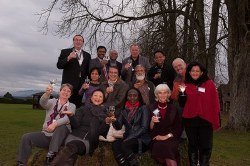
Contact: +41 79 507 6363; www.oikoumene.org/press
BOSSEY, Switzerland, Dec. 12, 2014 /Standard Newswire/ -- Why do we do what we do? What is our ecclesiological call to respond to the global water crisis? In what way is our response different from other actors on water justice issues?
Photo: Participants in EWN consultation celebrating the "gift of life" by extending a glass of clean drinking water. © WCC/Helen Putsman
To respond to these questions within a theological framework of water justice, the Ecumenical Water Network (EWN) of the World Council of Churches (WCC) convened 17 theologians from around the world at the Ecumenical Institute, Bossey, Switzerland, in a theological consultation on water justice, 8-11 December.
The consultation culminated a years-long process of theological reflection and was meant to articulate a theological framework to strengthen and justify the churches’ engagement on water justice.
The 9th Assembly of the WCC in Porto Alegre in 2006, issued a statement called "Water for Life," which stated that "Water is a symbol of life, a gift of God which needs to be preserved and shared for the benefit of all creatures and the wider creation."
Founded on that affirmation, the network continues to address the global water crisis through a rights-based approach with a justice perspective.
Only 0.3 percent of the planet's fresh water is available in the lakes and rivers for human consumption. Even though water is a scarce resource, the global water crisis stems not only from physical scarcity but from unequal distribution of the precious life-giving resource. Water is an issue of justice and of rights.
"Water for Life" underlined that "as churches, we are called to participate in the mission of God to bring about a new creation where life in abundance is assured to all (John 10:10; Amos 5:24). It is therefore right to speak out and to act when the life-giving water is pervasively and systematically under threat." The EWN was inspired by this affirmation and has continued its engagements on water justice issues.
WCC emphasis, after the Busan Assembly in 2013, on a "pilgrimage of justice and peace" challenges the EWN to delve deeper into its theological inspiration and motivation for engagement.
Inaugurating the consultation, Yorgo Lemopoulos, WCC deputy general secretary, said, "EWN's contribution through this theological framework on water justice will make the WCC's pilgrimage of justice and peace more dynamic, and by bringing different voices into the discourse of pilgrimage you are strengthening the unity of the church."
Rev. Dr Ioan Sauca, associate general secretary and director of the Ecumenical Institute in Bossey, reiterated the importance of water to the church and to the Christian faith. He also highlighted the fact that issues related to sustainable development, including water justice, have found a place in the curriculum of the Institute due to increased demand by the churches to address these issues.
The three-day consultation included more than two dozen theological contributions on various dimensions of water justice, including its biblical imperatives, themes of spiritual journey, indigenous struggles, gender dimensions of water justice, stories from the subaltern communities and moving toward an ethical praxis.
Participant Dr George Zachariah of the United Theological College, Bangalore, said, "Our ecumenical resolve to initiate a pilgrimage of justice and peace in the context of water injustice requires from us the nerve to contest the dominant pilgrimages of our times and to join the subaltern pilgrimages to make justice and peace tangible realities in our times."
The EWN Coordinator Dinesh Suna, who organized this consultation along with EWN's International Reference Group, said, "Theological framework that has emerged from the consultation will not only legitimize the engagement of EWN in issues related to water justice but will go on to become a point of reference for the churches and faith-based organizations to decipher their ecclesiological and diaconal engagements on issues of justice in general and on water justice in particular."
Plans call for publication of the consultation contributions in 2015.
More information: Ecumenical Water Network
The World Council of Churches promotes Christian unity in faith, witness and service for a just and peaceful world. An ecumenical fellowship of churches founded in 1948, by the end of 2013 the WCC had 345 member churches representing more than 500 million Christians from Protestant, Orthodox, Anglican and other traditions in over 140 countries. The WCC works cooperatively with the Roman Catholic Church. The WCC general secretary is the Rev. Dr Olav Fykse Tveit, from the [Lutheran] Church of Norway.




 Sign Up to Receive Press Releases:
Sign Up to Receive Press Releases: